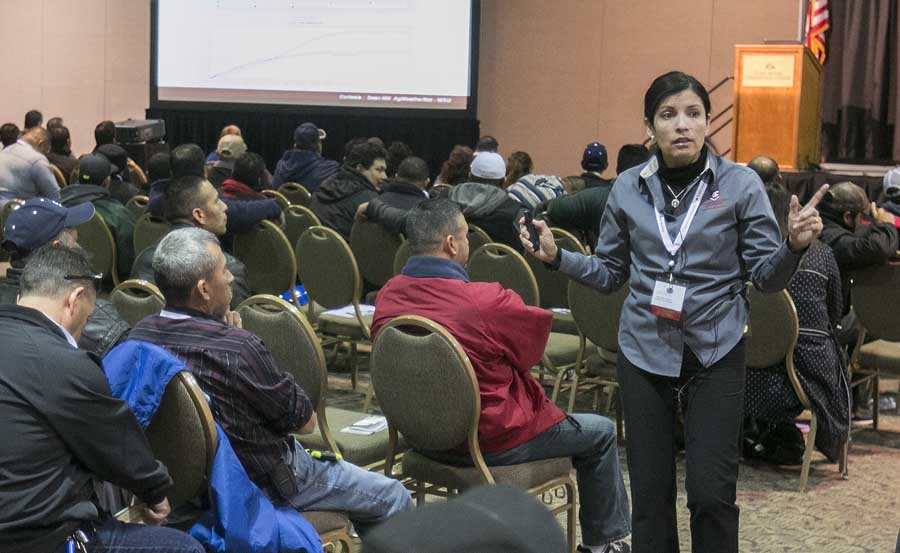
Melba Salazar-Gutierrez speaks about practical use of AgWeatherNet in orchards during one of the Spanish speaking sessions at the annual meeting of the Washington State Tree Fruit Association. (TJ Mullinax/Good Fruit Grower)
Eladio Gonzales recalls days in the not-so-distant past when he struggled to translate pesticide labels for his older, more experienced co-workers. At the time, perhaps 10 years ago, he wished the fruit industry provided him more training in Spanish, even though he was completely fluent in both languages.
“It was hard to have a place where to go to find this stuff,” said Gonzales, 33, an orchard manager for G.S. Long in Yakima, Washington.
Things have improved for Gonzales and his fellow Spanish-speakers. These days, state agencies, nonprofit groups and his own company hold classes and workshops entirely in Spanish.
In fact, Gonazales is one of the slated Spanish-speaking presenters at the annual meeting of the Washington State Tree Fruit Association, which is presenting two sessions in Spanish.
The Spanish sessions will be held Dec. 6, the middle day of the three-day conference, scheduled for Dec. 5-7 at the Wenatchee Convention Center. A wide array of Spanish topics will include control of little cherry virus, food safety, state pesticide rule changes and economic topics.
The purpose of the Spanish sessions is to “take communication barriers out of the way” said Sam Godwin, a Tonasket, Washington, grower and the annual meeting committee chair.
The convention has featured Spanish sessions for years now, and they don’t just deal with pesticides and tractor safety — information employees would need. Many Spanish speakers need even more information because they work at higher levels of decision making for large companies and own their own farms.
“A lot of the economic information is really geared at the guy who maybe was a foreman for a large company who has now bought a home and owns his own orchard,” Godwin said. For example, one of the presentations is called “Economic Profitability of Honeycrisp Apple Production.”
Gonzales, who has been working at the G.S. Long orchard off and on since middle school, agreed. He is used to giving Spanish presentations arranged by his company, both on the farm and in board rooms.
One of his duties the past few years, in addition to managing an orchard, has been teaching worker protection classes, giving him an unusual celebrity status in the industry. Many workers around the state recognize him and ask him where they can find more training.
He usually knows. In fact, his presentation at the annual meeting will cover just that — where Spanish speakers can look for upcoming training seminars.
“I believe the more Spanish training we can offer as an industry working together is only going to makes us stronger in the end,” he said. •
– by Ross Courtney






Leave A Comment